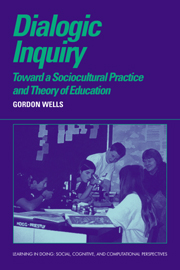Book contents
- Frontmatter
- Contents
- Conventions of Transcription
- Introduction
- Part I Establishing the Theoretical Framework
- Part II Discourse, Learning, and Teaching
- Part III Learning and Teaching in the zpd
- Appendix I A Social Constructivist Model of Learning and Teaching
- Appendix II Categories for the Analysis of Discourse
- References
- Index of Authors
- Index of Subjects
- Title in the series
Appendix I - A Social Constructivist Model of Learning and Teaching
Published online by Cambridge University Press: 09 November 2009
- Frontmatter
- Contents
- Conventions of Transcription
- Introduction
- Part I Establishing the Theoretical Framework
- Part II Discourse, Learning, and Teaching
- Part III Learning and Teaching in the zpd
- Appendix I A Social Constructivist Model of Learning and Teaching
- Appendix II Categories for the Analysis of Discourse
- References
- Index of Authors
- Index of Subjects
- Title in the series
Summary
A Social Constructivist Model of Learning and Teaching
Vygotskian theory suggests that the principal goal of education is to provide an environment in which students, however diverse their background, engage collaboratively in productive, purposeful activities which enable them to:
take over the culture's tool-kit of skills, knowledge and values so that they are able to participate effectively in the practices of the larger society
develop the disposition to act creatively, responsibly and reflectively in achieving their own potential and constructing a personal identity
These aims seem most likely to be achieved by:
Creating a classroom community which shares a commitment to caring, collaboration, and a dialogic mode of making meaning
Organizing the curriculum in terms of broad themes for inquiry that encourage a willingness to wonder, to ask questions, and to collaborate with others in building knowledge, both practical and theoretical, to answer them
Negotiating goals that:
challenge students to develop their interests and abilities
are sufficiently open-ended to elicit alternative possibilities for consideration
involve the whole person – feelings, interests, personal and cultural values, as well as cognition
provide multiple opportunities to master the culture's tools and technologies through purposeful use
encourage both collaborative group work and individual effort;
give equal value to thoughtful processes and excellent products.
Ensuring that there are occasions for students to:
use a variety of modes of representation as tools for achieving joint and individual understanding
present their work to others and receive critical, constructive feedback
reflect on what they have learned, both individually and as a community
receive guidance and assistance in their zones of proximal development.
- Type
- Chapter
- Information
- Dialogic InquiryTowards a Socio-cultural Practice and Theory of Education, pp. 335 - 336Publisher: Cambridge University PressPrint publication year: 1999
- 1
- Cited by



